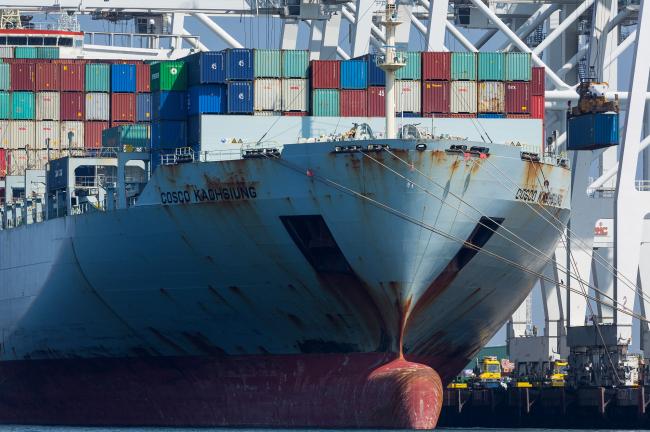 © Bloomberg. Containers sit stacked on the Cosco Kaohsiung cargo ship docked at the Port of Long Beach in Long Beach, California, U.S., on Wednesday, April 4, 2018. The U.S. trade deficit widened by more than forecast to a fresh nine-year high in February amid broad-based demand for imports, ahead of Trump administration tariffs that have raised the specter of a trade war.
© Bloomberg. Containers sit stacked on the Cosco Kaohsiung cargo ship docked at the Port of Long Beach in Long Beach, California, U.S., on Wednesday, April 4, 2018. The U.S. trade deficit widened by more than forecast to a fresh nine-year high in February amid broad-based demand for imports, ahead of Trump administration tariffs that have raised the specter of a trade war.(Bloomberg) — Escalating tensions between the U.S. and China could hurt a global trade expansion that’s already expected to be lower this year than in 2017, the World Trade Organization said Thursday.
The Geneva-based body warned that there are signs a looming global standoff is already affecting business confidence and investment decisions, possibly jeopardizing the projected growth.
The warning chimes with that of Christine Lagarde of the International Monetary Fund, who cautioned on Wednesday that the world economy must avoid being sucked into a protectionist spiral. The global trading system, which has reduced extreme poverty, cut living costs and created millions of high-paying jobs, “is now in danger of being torn apart,” she said.
“This important progress could be quickly undermined if governments resort to restrictive trade policies, especially in a tit-for-tat process that could lead to an unmanageable escalation,” WTO Director-General Roberto Azevedo said in a prepared statement Thursday.
“It is not possible to accurately map out the effects of a major escalation, but clearly it could be serious,” Azevedo told a news conference in presenting the WTO report.
|
Read More:
|
Azevedo told the news conference that “risks to the forecast are significant and they are predominantly on the downside” while adding that technically a trade war has not started.
Trade growth could suffer as a result of Trump’s pugnacious approach to trade and his administration’s preference for unilateral tariffs rather than negotiated solutions within the context of the WTO. His stance has already generated strong backlash from China.
“A cycle of retaliation is the last thing the world economy needs,” Azevedo said. “The pressing trade problems confronting WTO members is best tackled through collective action.”
The WTO said trade growth is likely to fall from 2017’s peak of 4.7 percent to 4.4 percent in 2018 and 4 percent in 2019, according to the report.
Over the past three months Trump has levied global tariffs on imports of steel, aluminum, washing machines and solar products — which have affected America’s allies and foes alike.
More recently Trump threatened to slap tariffs on up to $150 billion worth of Chinese products in response to China’s theft of U.S. intellectual property and technology secrets.
Though the U.S. hasn’t finalized the tariffs, China pledged to retaliate by imposing its own tariffs on up to $50 billion worth of U.S. exports, such as soybeans, cars, and aircraft.
Azevedo previously warned that a trade war between the U.S. and China could have a severe impact on the global economy and lead to a rapid reduction of trade growth around the world.
“The momentum is still there,” IMF Managing Director Lagarde told Bloomberg during an April 11 interview. “We continue to be optimistic,” she said. “We have to secure that growth, we cannot let it to be wasted.”
Lagarde warned that the escalating trade tensions between the U.S. and China could upset the trajectory of trade growth in the future.
“It took us ten years to get out of the financial crisis and we are now at the stage where our average growth around the world is close to what it was pre-financial crisis. Let us not rock that boat of growth,” she said.
(Updates with Bloomberg Economists after 5th paragraph.)
Fusion Media or anyone involved with Fusion Media will not accept any liability for loss or damage as a result of reliance on the information including data, quotes, charts and buy/sell signals contained within this website. Please be fully informed regarding the risks and costs associated with trading the financial markets, it is one of the riskiest investment forms possible.
Source: Investing.com


























